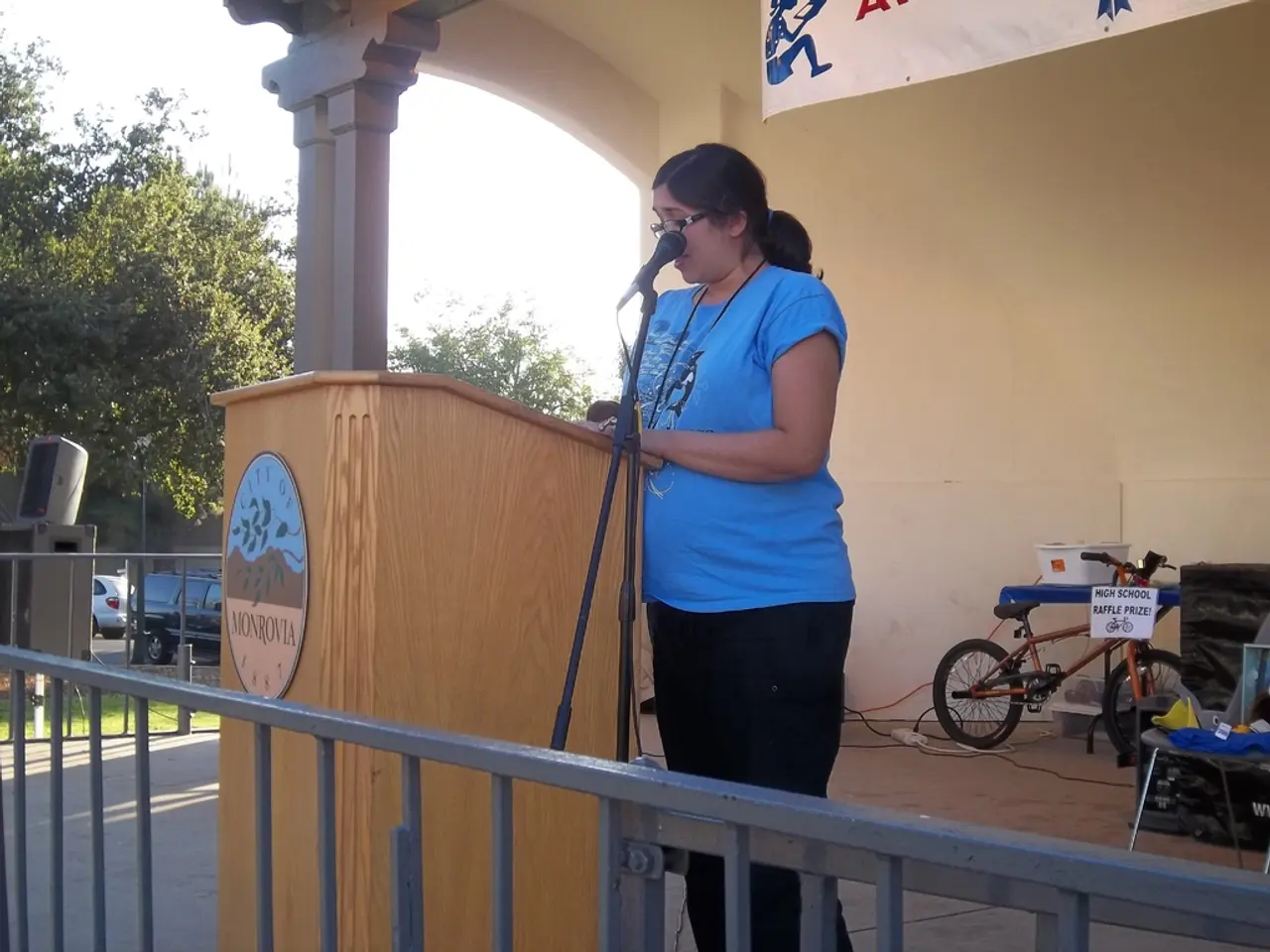Indigenous Maya Radio Station in California: Radio B'alam-Voces Maya
In the heart of Oakland, California, Radio B'alam - Voces Maya is making waves as an Indigenous-led, community-based internet radio initiative serving the Maya Mam people. This significant and growing community, originally from Guatemala, has found a home in Oakland, with many migrating due to civil war and socioeconomic challenges in their home country[1].
For years, many Mam immigrants concealed their Indigenous identities due to discrimination and the pressure to assimilate, even speaking their native language only in private[1]. Radio B'alam was created to counter this invisibility and affirm the presence, culture, and voices of Oakland's Mam people[1].
The station plays a crucial role in cultural preservation, broadcasting in the Mam language and promoting traditions such as marimba music and traditional clothing[1]. By doing so, it provides a space for the expression and celebration of Indigenous identity that is often overlooked in broader society, where Mam people are frequently mislabeled as simply "Latinx" or "Hispanic"[1].
Radio B'alam also fosters a sense of community among the dispersed Mam population in Oakland, enabling people to share stories, discuss challenges, and support one another across generations and experiences[1]. This is particularly important in a context where many face barriers to accessing mainstream media and public services due to language and cultural differences.
The station's impact extends beyond Oakland, with the Mam community’s voice increasingly recognised in local and statewide initiatives, such as the California Racial Equity Commission’s listening sessions, which are shaping the state’s first-ever Racial Equity Framework[2][4]. These sessions, often facilitated in Mam, English, and Spanish, help bring Mam perspectives into policy discussions and highlight the community’s specific needs, such as linguistic access, cultural competency in services, and protection from discrimination[2][4].
Despite the progress represented by initiatives like Radio B'alam, Oakland's Mam community continues to face structural inequities, discrimination, and fear tied to immigration status[1][5]. The presence of outlets like Radio B'alam and the participation in advocacy forums signal growing community resilience and a demand for recognition and equity[1][2][4].
In response to the COVID-19 pandemic, Radio B'alam has become a trusted source of information and guidance, covering a range of topics such as healthcare, legal rights, school systems, mental health, women's rights, and public benefits[6]. The station has also collaborated with lawyers to explain current immigrant policies and answer questions in real time[3].
The grant provided opportunities for international Indigenous radio stations to strengthen their infrastructure and broadcast systems[7]. The grant also created training opportunities for radio journalists from Indigenous communities around the world[7]. A Public Defenders' Office representative joined Radio B'alam to explain the rights of Mam people and how to protect themselves if stopped by the police[3].
In 2024, the Fund provided grants to 57 Indigenous communication projects benefiting Indigenous communities in 25 countries[8]. That year, Radio B'alam received a grant from Cultural Survival's Indigenous Community Fund[8]. Crecencio Ramirez, co-founder of Radio B'alam - Voces Maya, arrived in the U.S. as a teenager from Guatemala[9].
A declaration outlining the unique characteristics of the Mam people has been developed and is being used in court to build awareness within the legal system[9]. Many Mam people used to hide their identities due to discrimination and fear of assimilation. The first program aired in December 2020 and quickly grew from 100 listeners to over 76,000, reaching listeners not just in the Bay Area but across the U.S. and in Guatemala[10].
References: [1] https://www.culturalsurvival.org/publications/cultural-survival-quarterly/radio-b-alam-voces-maya-amplifying-voices-oaklands-mam-community [2] https://www.latimes.com/california/story/2021-02-10/california-racial-equity-commission-hears-from-indigenous-communities [3] https://www.culturalsurvival.org/news/radio-b-alam-voces-maya-offers-know-your-rights-training-sessions-mam-community-members [4] https://www.culturalsurvival.org/publications/cultural-survival-quarterly/radio-b-alam-voces-maya-amplifying-voices-oaklands-mam-community [5] https://www.culturalsurvival.org/publications/cultural-survival-quarterly/radio-b-alam-voces-maya-amplifying-voices-oaklands-mam-community [6] https://www.culturalsurvival.org/publications/cultural-survival-quarterly/radio-b-alam-voces-maya-amplifying-voices-oaklands-mam-community [7] https://www.culturalsurvival.org/publications/cultural-survival-quarterly/radio-b-alam-voces-maya-amplifying-voices-oaklands-mam-community [8] https://www.culturalsurvival.org/publications/cultural-survival-quarterly/radio-b-alam-voces-maya-amplifying-voices-oaklands-mam-community [9] https://www.culturalsurvival.org/publications/cultural-survival-quarterly/radio-b-alam-voces-maya-amplifying-voices-oaklands-mam-community [10] https://www.culturalsurvival.org/publications/cultural-survival-quarterly/radio-b-alam-voces-maya-amplifying-voices-oaklands-mam-community
The Radio B'alam - Voces Maya station in Oakland is not just a home-and-garden or lifestyle matter, but it plays a vital role in education-and-self-development for the Maya Mam community by promoting cultural preservation, fostering community, and advocating for their rights. By learning about their traditions, language, and experiences, it broadens one's understanding of various cultures and encourages a lifelong learning approach.




